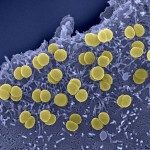Lien vers Pubmed [PMID] – 33036804
Lien DOI – S0264-410X(20)31220-210.1016/j.vaccine.2020.09.050
Vaccine 2020 Oct; ():
The multicomponent meningococcal serogroup B vaccine (4CMenB) is currently indicated for active immunization against invasive meningococcal disease caused by Neisseria meningitidis serogroup B (MenB). However, genes encoding the 4CMenB antigens are also variably present and expressed in strains belonging to other meningococcal serogroups. In this study, we evaluated the ability of antibodies raised by 4CMenB immunisation to induce complement-mediated bactericidal killing of non-MenB strains.A total of 227 invasive non-MenB disease isolates were collected between 1 July 2007 and 30 June 2008 from England and Wales, France, and Germany; 41 isolates were collected during 2012 from Brazil. The isolates were subjected to genotypic analyses. A subset of 147 isolates (MenC, MenW and MenY) representative of the meningococcal genetic diversity of the total sample were tested in the human complement serum bactericidal antibody assay (hSBA) using sera from infants immunised with 4CMenB.Serogroup and clonal complex repertoires of non-MenB isolates were different for each country. For the European panel, MenC, MenW and MenY isolates belonged mainly to ST-11, ST-22 and ST-23 complexes, respectively. For the Brazilian panel, most MenC and MenW isolates belonged to the ST-103 and ST-11 complexes, respectively, and most MenY isolates were not assigned to clonal complexes. Of the 147 non-MenB isolates, 109 were killed in hSBA, resulting in an overall coverage of 74%.This is the first study in which 147 non-MenB serogroup isolates have been analysed in hSBA to evaluate the potential of a MenB vaccine to cover strains belonging to other serogroups. These data demonstrate that antibodies raised by 4CMenB are able to induce bactericidal killing of 109 non-MenB isolates, representative of non-MenB genetic and geographic diversity. These findings support previous evidence that 4CMenB immunisation can provide cross-protection against non-MenB strains in infants, which represents an added benefit of 4CMenB vaccination.

